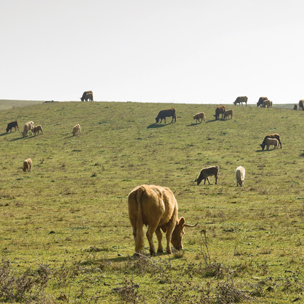July 30, 2014 — In our recent feature, “Has Meat Met Its Match?,” writer Rowan Jacobsen explores ways people can (now and possibly in the future) reduce the environmental and food security impacts of their diets, including entomophagy (bug-eating), synthetic meat and vegetarian substitutes. If none of those fits your needs, there are plenty of other ways to eat meat more sustainably.
Maybe cutting back would work for you. Meatless Mondays — an idea initiated during World War I to conserve resources — is being revived as a way to encourage people to forgo meat one day a week for environment and health benefits, including water conservation and reduced fossil fuel dependence.
Another approach is to do a species switch-out. It takes far less grain (and therefore cropland) to produce a pound of pig or poultry than to produce a pound of cow — so choosing chicken fajitas over beef tacos could help.
If you’re really craving a burger or succulent steak, buying beef from well-managed grazing systems can be another easy swap for sustainability. Compared to feedlots, such systems reduce soil erosion, water pollution and biodiversity loss (though production of methane, a potent greenhouse gas, may be higher). Scientists are also working to reduce cattle’s environmental footprint through improved diet, genetics and manure management.
Ensia shares solutions-focused stories free of charge through our online magazine and partner media. That means audiences around the world have ready access to stories that can — and do — help them shape a better future. If you value our work, please show your support today.
Yes, I'll support Ensia!
